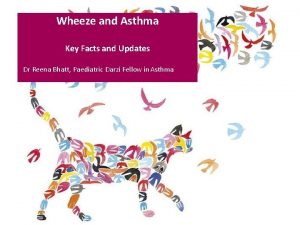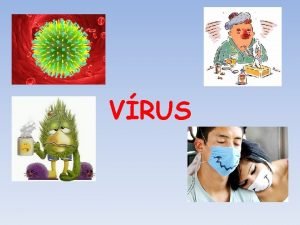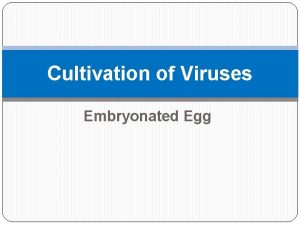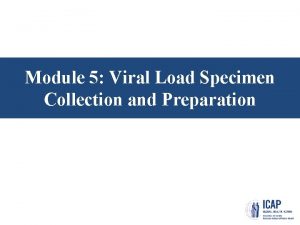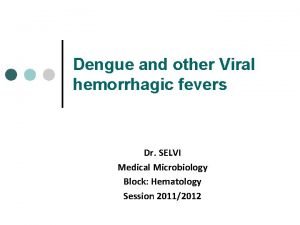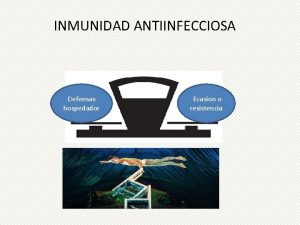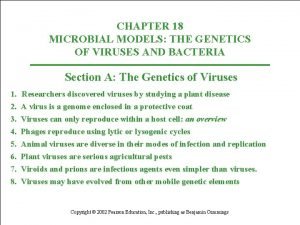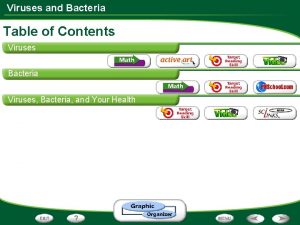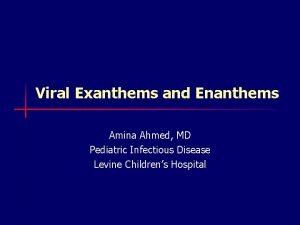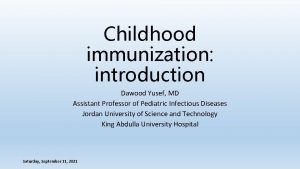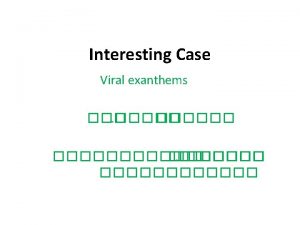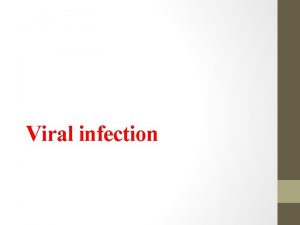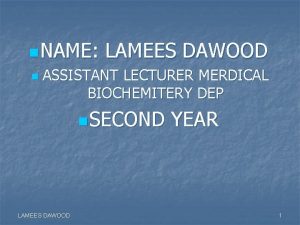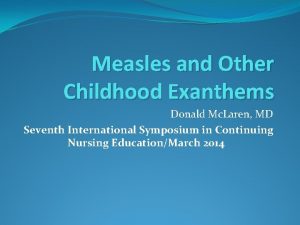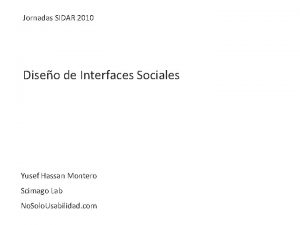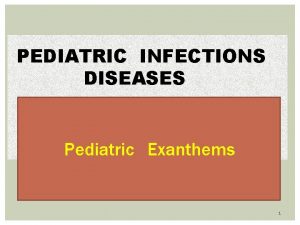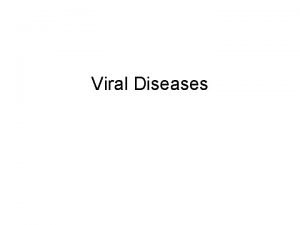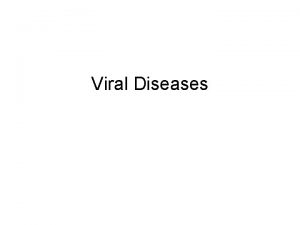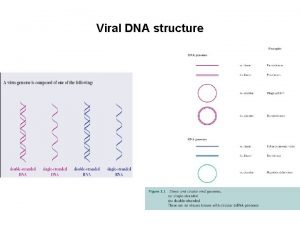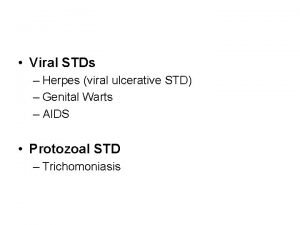Viral exanthems and enanthems Dawood Yusef MD Assistant






















- Slides: 22

Viral exanthems and enanthems Dawood Yusef, MD Assistant Professor of Pediatric Infectious Diseases Jordan University of Science and Technology King Abdullah University Hospital Monday, March 8, 2021 1

Definitions • Exanthem: a generalized cutaneous eruption associated with a systemic disease. • Enanthem: a mucus membrane eruption, can be associated with exanthems • • • Macule: flat lesions that vary in color from the surrounding skin. Size <1 cm Patch: Large macule >1 cm Papule: palpable, discrete lesions measuring <0. 5 cm diameter Maculopapular Nodule: Large papule >0. 5 cm. Plaque: a well-circumscribed, elevated, superficial, solid lesion, >1 cm Monday, March 8, 2021 2

Monday, March 8, 2021 3

Definitions • • Vesicle: small (<0. 5 cm), circumscribed skin papules containing serous fluid Bullae: large (≥ 0. 5 cm) vesicles Pustule: small (<0. 5 cm), circumscribed skin papules containing pus Wheal: elevated edematous skin area that are often erythematous, erythematous border and pale center usually • Petechiae: Pin-point, round red lesions usually caused by capillary skin bleed, does not blanch with pressure (non-blanchable) • Purpura: Large (3 -10 mm) red or purple skin lesions usually caused by bleeding beneath the skin, non-blanchable, palpable or non-palpable • Echemosis: Large purpura >1 cm Monday, March 8, 2021 4

Monday, March 8, 2021 5

Introduction • Pathophysiology: Direct damage, toxins, or immune response • Causes: Drugs, infection, others • Determining the cause is based on morphology, distribution and time course, as well as contacts, immunization status and the rest of physical examination Monday, March 8, 2021 6

Measles • Humans only. Incubation period 10– 12 days • Begins with prodrome: fever, conjunctivitis, rhinorrhea, sore throat and a dry cough. Koplik spots (gray–white papules on the buccal mucosa) may be seen. • ~3 days later, coalescing erythematous macules and papules erupts, beginning in the hairline area, spreads over the rest of the skin over a few days, resolves in the same order as its appearance, and often desquamate. Monday, March 8, 2021 7

Measles • Acute encephalitis, often results in permanent brain damage, 1 in 1000 cases • Subacute sclerosing panencephalitis (SSPE) is a rare degenerative CNS disease characterized by behavioral and intellectual deterioration and seizures, 7 -10 years after wild-type measles infection. • Highly communicable. Direct contact with droplets or, less commonly, airborne spread. • Contagious 4 days before the rash to 4 days after • Dx: Serology. Rx: Vitamin A Monday, March 8, 2021 8

Rubella (German measles) • Subclinical, or mild generalized erythematous maculopapular rash, lymphadenopathy, and slight fever. Starts on the face, generalized in 24 hrs, lasts 3 d. • Lymphadenopathy, may precede rash, often posterior auricular or suboccipital, can be generalized. • Conjunctivitis and palatal enanthem. • Transient polyarthralgia and polyarthritis rarely in children, common in adolescents and adults, especially females. • Encephalitis and thrombocytopenia are complications. Monday, March 8, 2021 9

Rubella (German measles) • Congenital Rubella Syndrome. miscarriage, fetal death, or anomalies: ophthalmologic (cataracts, retinopathy, glaucoma), cardiac (patent ductus arteriosus, peripheral pulmonary artery stenosis), auditory, or neurologic (meningoencephalitis, microcephaly, mental retardation). • Growth restriction, pneumonitis, hepatosplenomegaly, thrombocytopenia, and dermal erythropoiesis (so-called “blueberry muffin” lesions). Monday, March 8, 2021 10

Rubella (German measles) • Humans only. Incubation period 2 -3 weeks. • Droplets transmission. Few days before to 7 days after the rash. • MMR vaccine. Monday, March 8, 2021 11

Parvovirus B 19 (Erythema Infectiosum, Fifth Disease) • Mild fever, malaise, myalgia, and headache in 30% of patients. Followed by facial rash “slapped cheek” accompanied by circumoral pallor. • A symmetric, macular, lace-like, and often pruritic rash on the trunk, moving peripherally. Fluctuate with temperature and sunlight, for weeks to months. • Arthralgia and arthritis <10% of children but commonly occur among adults, especially women. Monday, March 8, 2021 12

Parvovirus B 19 (Erythema Infectiosum, Fifth Disease) • Or atypical rash: rubelliform or petechial, papulopurpuric gloves-and -socks syndrome • Aplastic crisis in patients with hemolytic anemias (eg, sickle cell disease) • • During pregnancy can cause fetal hydrops. Replicates in human erythrocyte precursors. Only humans. Once rash appears, patients is no longer contagious. Before that, droplet precautions. Monday, March 8, 2021 13

Roseola Infantum (HHV 6) • Human herpesvirus 6 (HHV-6). Only humans!. • Cervical and characteristic postoccipital lymphadenopathy, gastrointestinal tract or respiratory tract signs, and inflamed tympanic membranes. • Fever usually is high (temperature >39. 5°C, for 3 to 7 days). • Roseola: erythematous maculopapular rash, appears once fever resolves and last hours to days. • Febrile seizures are the most common complication Monday, March 8, 2021 14

Varicella Zoster Virus (VZV) • Primary infection chickenpox. Only humans. • Generalized, pruritic, vesicular rash ~250 -500 lesions in varying stages of development and resolution. Low-grade fever. • Complications: bacterial super-infection, pneumonia, CNS (acute cerebellar • • ataxia, encephalitis), thrombocytopenia. More severe in infants, adolescents, and adults. Reye syndrome. Secondary bacterial infection. Immunocompromised children Hemorrhagic varicella Airborne isolation Monday, March 8, 2021 15

Monday, March 8, 2021 16

Varicella Zoster Virus (VZV) • Cephalocaudal pattern, involving the scalp and mucous membranes (Enanthem) • Remains latent in the dorsal root ganglia. • Reactivation results in herpes zoster (“shingles”), a grouped vesicular lesions in the distribution of 1 to 3 sensory dermatomes, sometimes accompanied by pain and/or itching localized to the area. Monday, March 8, 2021 17

Enteroviruses 1 - Hand-foot-mouth disease: Coxsackie A, other enteroviruses • Fever, lymphadenopathy • 2– 8 -mm painful oval, gray vesicles on the palmar and plantar skin, buccal mucosa and tongue after 1– 2 days. • Papular and vesicular lesions can also occur on other parts of the body. • In the oral cavity, the hard palate, tongue and buccal mucosa are affected. • Self limited, supportive management. • Complications; other infections. Monday, March 8, 2021 18

Molluscum Contagiosum • Pox virus. 1 to 20 discrete, 2 - to 5 -mm-diameter, flesh-colored to translucent, dome-shaped papules, some with central umbilication. • Trunk, face, and extremities. • Self-limited, resolves in 6 to 12 months. • Highly contagious Monday, March 8, 2021 19

Erythema Multiforme • Target skin lesions. Central dusky zone surrounded by ring of pale edema, and an outer ring of erythema • • • Hypersensitivity reaction It is frequently recurrent HSV, mycoplasma pneumonia, drugs May last for 2– 3 weeks Erythema multiforme major and minor, Stevens Johnsons syndrome Monday, March 8, 2021 20

Scarlet fever • Group A strep- erythrogenic exotoxins • Often with pharyngitis and rarely with pyoderma • Mild disease: confluent erythematous sandpaper-like rash (1 mm papules with red background). Head and neck trunk limbs desquamation • The epidemiologic features, symptoms, signs, sequelae, and treatment are the same as those of streptococcal pharyngitis. Monday, March 8, 2021 21

Any question? Thank you Monday, March 8, 2021 22
 Story of prophet dawood
Story of prophet dawood Hazrat dawood family tree
Hazrat dawood family tree Hazrat dawood miracles
Hazrat dawood miracles Aisha dawood
Aisha dawood Aisha dawood
Aisha dawood Dr dawood
Dr dawood Dr dawood
Dr dawood Section 24-1 viral structure and replication
Section 24-1 viral structure and replication Viral induced wheeze vs asthma
Viral induced wheeze vs asthma Vrus
Vrus Viral replikasyon basamakları
Viral replikasyon basamakları Egg inoculation diagram
Egg inoculation diagram Viral inoculation in embryonated egg
Viral inoculation in embryonated egg Egg inoculation technique
Egg inoculation technique Spasmodic croup
Spasmodic croup Varicela variola
Varicela variola Morfologia viral
Morfologia viral Sample rejection criteria
Sample rejection criteria Meningitis viral antibiótico
Meningitis viral antibiótico Causes of viral hemorrhagic fever
Causes of viral hemorrhagic fever Inmunidad
Inmunidad Viral infection
Viral infection Viral
Viral








